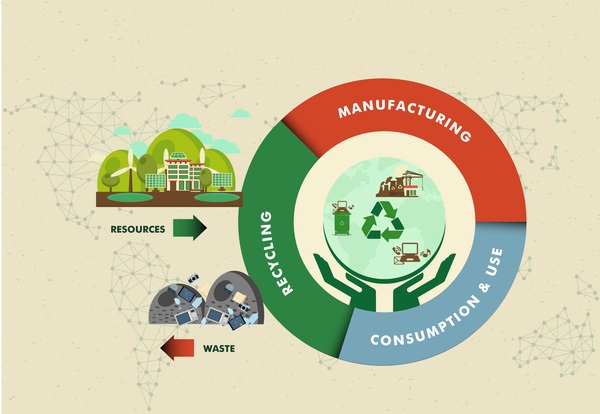DRINKS GROUPS URGE EU TO CONSIDER DEPOSIT REFUNDS AS PART OF 2030 CIRCULAR ECONOMY AIMS
European non-alcoholic drinks associations have come together to push for Deposit Refund Systems* to have a higher priority on the European Union’s sustainability agenda as the bloc looks to revise its 1994 Packaging and Packaging Waste Directive.
The European Soft Drinks Association (UNESDA), Natural Mineral Waters Europe (NMWE) and Zero Waste Europe (ZWE) are all urging the EU to acknowledge the role of DRS as part of an accelerated transition to a circular economy. According to the EU’s Circular Economy Action Plan, it has a target to make all packaging reusable and recyclable by 2030.
The three associations say that Deposit Refund Systems needs to be part of the solution to contribute to that collective objective. In addition, the EU’s Single Use Plastics Directive imposes a 90% collection rate for plastic beverage bottles by 2029 and a minimum of 25% recycled plastic in PET bottles from 2025 (and 30% from 2030 in all beverage bottles).

“Given current collection performances across the EU, many member states are unlikely to achieve the collection targets,” said Nicholas Hodac, UNESDA’s director general. “This is why we support well-designed DRS as one of the most efficient options for meeting the collection and recycled content targets set in the EU’s Single Use Plastics Directive. (It is also) an opportunity to create a closed-loop recycling system guaranteeing the material is returned and recycled in new beverage containers.”
The associations have also reiterated their commitment to collaborate with policymakers and local stakeholders in the implementation of efficient industry-wide collection schemes across the EU and to support the establishment of minimum requirements for new schemes.
“Deposit Refund Systems have not only delivered high collection rates for beverage packaging in countries where they are in place, but they also have the benefit of providing high-quality food-grade recycled material in a clean single stream,” commented NMWE’s secretary general Patricia Fosselard. “They can also contribute towards the EU’s climate objectives, for example by reducing the need for virgin materials thanks to closed-loop recycling.”
“Deposit refunds not addressed” says drinks associations
Fosselard added: “In spite of their excellent track record, the EU Packaging and Packaging Waste legislation does not currently address DRS in any way, nor does it secure closed-loop recycling for food-grade materials.” It is hoped that the European Commission in Brussels can play a core role in fixing the problem by developing basic-level requirements to assist EU member states to provide a strong framework for the establishment of efficient new DRS.

“Such minimum requirements should build on those for Extended Producer Responsibility schemes laid down in the Waste Framework Directive,” said Joan Marc Simon, the director of Zero Waste Europe. “Setting up this guidance at EU level could help ensure that DRS infrastructure across member states also accommodates, where possible, refillable packaging, in line with the EU goals on packaging waste prevention and reuse.”
With a swift adoption of those minimum requirements, UNESDA, NMWE and ZWE say they are confident there will be faster movement towards meeting both circular economy and climate objectives.
In contrast, the Scottish government is introducing a drinks deposit return scheme from July next year, which the British Soft Drinks Association says is arriving too early after the impact of Covid-19. The BSDA has raised a string of concerns from the cost of the scheme to VAT rules and logistics.
Basic principles for DRS
But NMWE, UNESDA and ZWE believe that DRS will work if the schemes are established along some basic principles related to geographical and material scope, governance, consumer convenience and incentivisation, and drinks producers’ access to recycled materials. They have outlined some key principles for setting up an efficient DRS for beverage packaging, some of which are outlined below:
Material scope – Include relevant drinks packaging types and sizes (up to three litres) and accommodate refillable packs from the outset
Return Rates – Achieve at least 90% for each packaging material
Governance – DRS to be set up and run by the relevant industry in a not-for-profit structure such as a central deposit management organisation (CDMO) that includes drinks retailers, and be subject to a transparent, reporting and verification system.
Legislation – Domestic laws to clearly outline elements such as the obligations on producers, the take-back obligations of retailers, the powers of the CDMO, and measures to minimise fraud
Redemption – The system, both in-store and out-of-home, should be convenient for consumers to incentivise a ‘bring back’ culture (including the use of reverse-vending machines) and retailers should be mandated to take back all deposited drinks packaging materials, subject to space limitations for small operators.
* A Deposit Refund System is a collection scheme whereby consumers pay a small deposit fee for their packaging at the point of purchase and are reimbursed upon the return of the empty packaging to specific collection points.
Join us at SIAL Paris as exhibitor Join us at SIAL Paris as visitor
